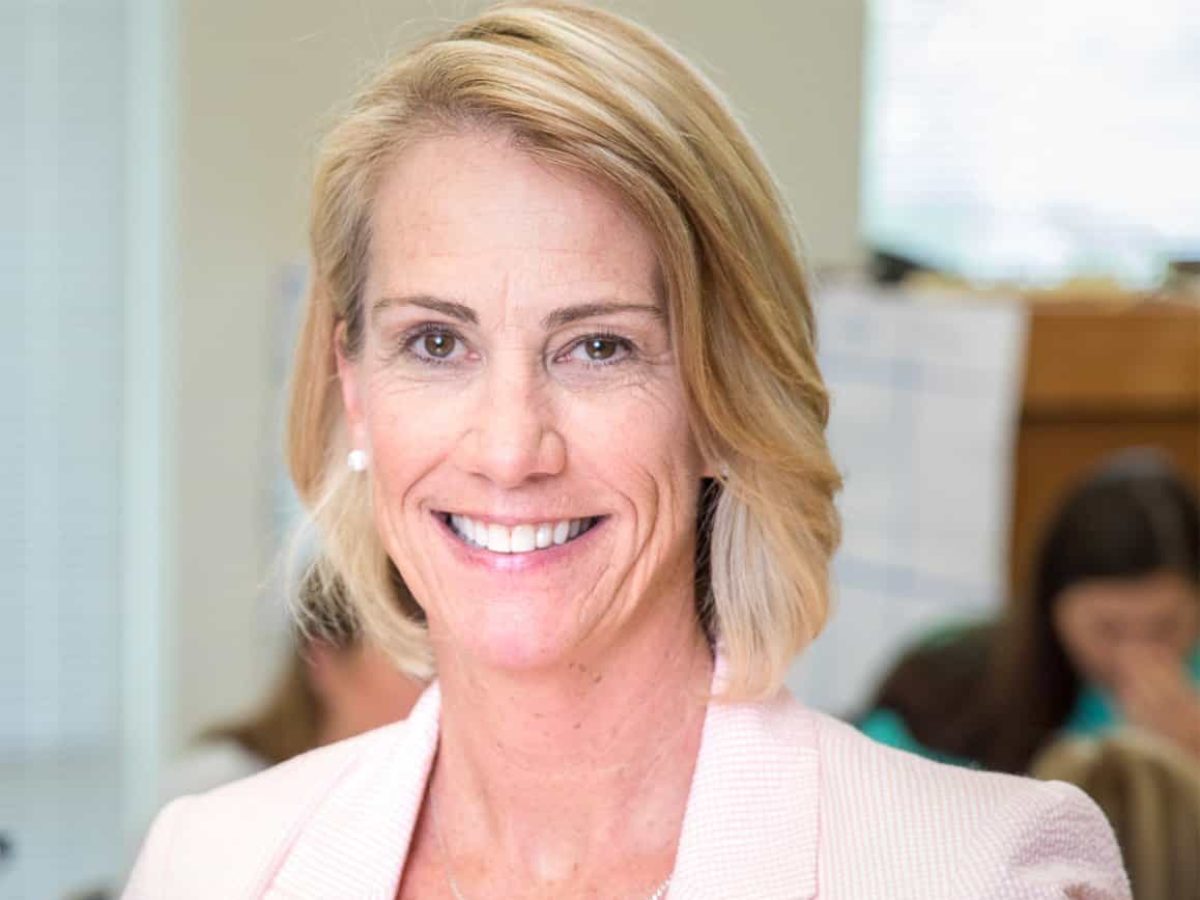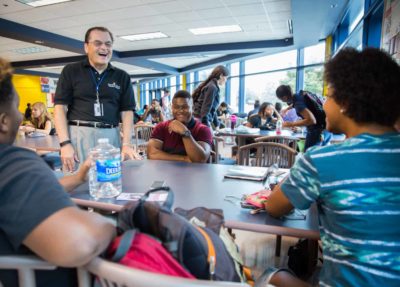
Jen Mangrum, the Democratic candidate for state superintendent of public instruction, made her case to proponents of charter schools during a virtual forum last Thursday night.
The forum, hosted by the North Carolina Association for Public Charter Schools and the North Carolina Coalition for Charter Schools, featured John Locke Foundation’s Vice President of Marketing and Communications Donna Martinez asking Mangrum a series of questions about her stance on a variety of charter school issues.
The Republican candidate, Catherine Truitt, will participate in her own forum with the organizations on Wednesday night.
In the interview, Mangrum provided a more complete picture of her views on charter schools, closing out her talk by speaking directly to charter school families.
“Charter school families need to know: I don’t think that because you’re a charter school family, there’s something negative about you,” she said. “What I think is we need to have conversations about how do we make all public schools spaces where children thrive?”
Charter schools were first approved to open in North Carolina in the late 1990s, but the law set a cap for the number that could exist at 100. And initially, charter schools weren’t really a partisan issue. For example, when they were approved, Democrats were still solidly in control of state government.
The issue became more controversial in 2011 when the Republican-led General Assembly lifted the cap on charter schools. Since then, the number of charter schools has doubled and support of the schools has become much more divided by political party. Typically, Republicans support school choice in all its forms — charter schools, opportunity scholarships, education savings accounts, etc.
Thus far, Mangrum has been less supportive of school choice.
For instance, in an INDY Week candidate questionnaire, this is what she had to say about charters.
“At the very minimum, I would like a moratorium on opening charter schools. Charter schools are the ‘reform movement’ of the wealthy and corporate America. They have not worked for nearly 2 decades and school districts have suffered because of them. While public schools are underfunded, money is going to charters and duplicating systems while they are segregating our schools. Ideally, I’d like to move any *successful charter schools under the control of the district office. Under this new structure, school districts would have the option to grant calendar flexibility, increased school hours, and implement other initiatives and innovations if they thought they’d be an asset to the school system.
“*I define successful charter schools as those with diverse populations, provide transportation, free lunch and serve students with disabilities.”
On Thursday night, when asked if she thought charter schools were siphoning money from traditional public schools, she turned instead to the topic of education funding generally.
“First of all, I don’t think North Carolina is doing its constitutional obligation to fund public schools,” she said.
She went on to say that she felt like the state was setting up charters and traditional public schools to fight over “minimal funds.”
“I feel like we’re fighting over, ‘Is there a piece of the pie for me?’” she said. “When really we should be collectively saying, ‘Fund us properly so that we don’t have to fight over funding.’”
Martinez pressed her, asking, “Do you believe that charter schools are draining funds from district schools?”
Mangrum replied, “I believe that we’re all fighting for proper funding, yes.” She then went on to clarify: “I believe that funds are being taken from public schools, traditional public schools, to help pay for charter schools, yes.”
She said, however, that if all public schools had enough money, there would be no argument between them.
Martinez pegged the number of students on waiting lists for charter schools at 65,000 students and asked Mangrum if she thought there should be a cap.
“I don’t think there should be a cap on enrollment growth, but I’d like to see a cap on the number of charter schools,” Mangrum said. “And I kind of wonder why charter schools would even want more charters schools. Cause the idea is … it’s a free market system … you offer something that public schools don’t. So I’m not really sure why even charter schools would want more charter schools. Could you help me understand that?”
Martinez said she was just there to ask questions and asked Mangrum to clarify her answer. Mangrum ultimately said she would like to reestablish a 100-school cap for charter schools until the state gets funding under control. But, she added, that wasn’t something under the purview of the superintendent of public instruction.
When asked what she’d say to parents who like their charter schools, Mangrum said she wants the students and teachers in charter schools to do well.
“I care about their children, and they’ll be under my purview in that my job is to provide resources and to remove barriers that cause them not to be successful,” she said, adding later: “I’m not anti-charter schools as much as I’m, ‘How do we do this in a way that everybody has what they need?’”
Martinez asked how Mangrum would do that. Mangrum said she would fight for the recommendations in the WestEd report, a report created by an independent consultant to find a way to meet the mandates of the long-running Leandro education case in North Carolina. Those recommendations include a considerable increase in funding for public education.
“Just because I think that we need to look at the policies that govern charter schools, doesn’t mean I don’t want the best for the children that are in them, doesn’t mean that I want to close them and shut them down, doesn’t mean that I don’t think good things are happening,” Mangrum said.
Martinez said that charter schools usually poll well from ethnic and racial minority families. She asked Mangrum what she says to these families who are looking for “equity and opportunity,” and like charters.
“Take it. I mean I do think that every child needs to find what fits them,” she said, adding later: “I appreciate that parents are trying to find the best fit for their child.”
Martinez asked Mangrum if she supports school choice.
“Well yeah, absolutely,” Mangrum said.
Martinez followed up by asking if she would support a change in the education funding model in the state to have money follow the student no matter where they go to school.
“That one I don’t know a lot about. I’ll just be honest,” Mangrum said. “I don’t know. I’d have to look into that.”
On the topic of resegregation, Martinez asked how charter schools, which have such a low total percentage of the student population in North Carolina, can be contributing to school segregation — an assertion that Mangrum has made publicly before.
Mangrum cited a 2017 Duke University study that came to those conclusions.
“Maybe ‘cause’ is not the best word. But it has continued to influence it and broaden segregation,” she said, adding later: “You know what, Donna? It’s the same with traditional public schools, too. This isn’t just a charter school problem.”
For another question, Martinez cited an American University study by Seth Gershenson that found that charter schools have more Black teachers than traditional district schools and that Black students in charter schools are more likely to have a Black teacher than those in traditional public schools. She asked Mangrum her theory about why that was.
“I did not know that and I say kudos. Great,” Mangrum said. “I need to look more into that. Because we definitely have to recruit more teachers of color.”
When asked if she thought charter schools had appropriate oversight and accountability, Mangrum said she thinks they do, which is in contrast to what she said in this piece she wrote for EducationNC. There she said: “… charter schools have little to no oversight.”
She went on in her answer to Martinez to say that the one area where she would like more “transparency” is in the business relationship between Charter Management Organizations (CMO) and the charter schools they manage.
Her main concern with the relationship between the two is when the CMO is a for-profit organization, she said.
“Typically, if you’re making a profit, some student isn’t getting what they need,” she said.
She said she wants to know how money is being spent and if it’s being spent correctly. She said she wants to know that for both charter schools and traditional public schools.
The conversation moved to whether Mangrum would be willing to close a charter school if she didn’t like the relationship between a for-profit CMO and the school. Mangrum said it was too hypothetical to answer, but expanded some on her thinking.
“The state does check into charter schools, as well as they check into traditional schools. I know that some charter schools have been closed because they haven’t been appropriate with funding,” she said. “That’s part of the job. And so, can I close them or not? I mean that’s hypothetical. I don’t even know if I have the power. My guess is it goes to the General Assembly. But I certainly would provide the information that I find to the General Assembly and the State Board (of Education) and say here’s what we’re seeing.”
Martinez went on to talk about the fact that charters can be closed if they don’t meet expectations. She asked Mangrum if she supports the fact that they can be closed, and asked if she would support that for traditional public schools as well.
Mangrum said she thinks shutting down a school should be done very carefully. For instance, it shouldn’t happen in the middle of the year because that could be disruptive. She said there would need to be a plan, and a shut-down would have to be well thought out.
“I don’t know who actually shuts them down. I’m assuming it’s the State Board (of Education). But the State Board recommends that a school shuts down, to me we need to have lots of conversation about why that is. What’s happening? What have we done to save the school? How do we help the kids that are there?”
Note: The State Board of Education is, ultimately, the group that decides whether a charter school should close.
As part of her closing comments, Mangrum said that charter schools need to be inclusive. She said there are some “spaces” where they haven’t been, and that it needs to be talked about.
“And I know it upsets people because they love the schools they’re in,” she said. “And I’m not trying to take your schools away. I’m trying to say, ‘How can we do this better? How can we do this in a way that supports everybody?’”
When Martinez was done with her questions, she turned it back over to representatives from the two host organizations, but Mangrum got a few more words in, including:
“I’m not a bad guy. I really am not. I’m a teacher. I’m a former third grade teacher. I just want to do what’s best for all our kids,” she said.
Watch the forum below:




